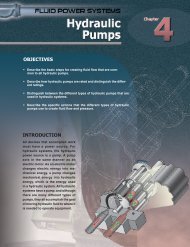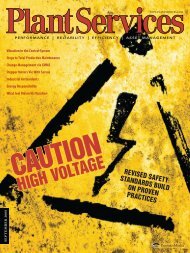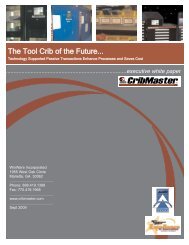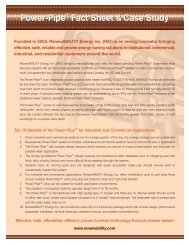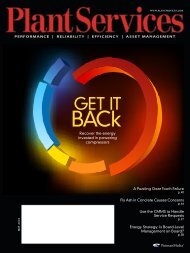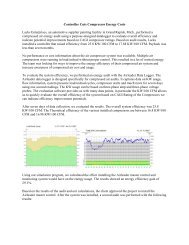POWER UP A WINNER - Plant Services
POWER UP A WINNER - Plant Services
POWER UP A WINNER - Plant Services
You also want an ePaper? Increase the reach of your titles
YUMPU automatically turns print PDFs into web optimized ePapers that Google loves.
asset manager<br />
david berger, P.Eng.<br />
new Roles for CMMS Vendors<br />
Expect more than a shrink-wrapped box of software<br />
AS CMMS software becomes more sophisticated and<br />
mission-critical, the dependence on your vendor increases.<br />
It’s therefore important not only to choose a CMMS package<br />
that is right for you, but a CMMS vendor with whom you<br />
can partner over the long term.<br />
As they move from suppliers of software licenses to full<br />
strategic partners, vendors have amassed a number of products<br />
and services that can help you manage your growing<br />
investment in assets.<br />
Best pRACtices<br />
One noteworthy change is the increasing reliance on vendor<br />
knowledge of asset-management best practices. You might<br />
assume that because a given vendor has sold CMMS software<br />
to hundreds or even thousands of companies, it must<br />
have acquired considerable knowledge. Savvy vendors have<br />
picked up on this supposition, and are offering many of the<br />
following products/services:<br />
Industry-specific software: As competition increases,<br />
CMMS vendors are looking for more marketable competitive<br />
advantages such as deep knowledge of a given industry.<br />
This includes software features that ensure compliance with<br />
industry-specific legislation, as well as more intimate understanding<br />
of industry practices. Some vendors have hired<br />
experts with extensive experience in a given industry to help<br />
develop relevant product and service offerings.<br />
Standard data: A handful of CMMS vendors have standard<br />
data to sell or provide free of charge when customers purchase<br />
their software. Standard data can include job plans, standard<br />
operating procedures (SOPs), preventive maintenance routines,<br />
estimated or standard hours to complete tasks and coded field<br />
options (e.g., problem and cause codes). Data can be specific to<br />
an asset type or classification, such as data for electrical devices.<br />
As well, it can be industry-specific, for example, data relevant to<br />
pulp and paper mills.<br />
Process mapping: CMMS vendors can facilitate process improvement<br />
during the software implementation. This typically<br />
involves drafting process maps reflecting the current state, and<br />
comparing them to future-state processes with the appropriate<br />
CMMS functionality. The gap between current and future<br />
states must be addressed carefully in terms of configuration of<br />
software, training on processes, project management and, most<br />
importantly, change management to ensure CMMS users buy<br />
into the new processes.<br />
Configuration: The flexibility of modern CMMS software<br />
is demonstrated by the ease with which it can be tailored to<br />
your needs, such as configuring menus, data entry screens,<br />
reports, alerts, approvals, equipment hierarchy and workflows.<br />
In years past, this often required customization, a<br />
term synonymous with a large, upfront investment in time<br />
and money, and a costly upgrade path. Today’s software<br />
A sMAll handful of CMMS vendors<br />
hAVe standARd data to sell, or<br />
provide free of chARge.<br />
is easy to configure to a wide range of business process<br />
options, regardless of company size, industry, competitive<br />
strength, level of sophistication or organizational readiness.<br />
Configuration takes little time and the cost is minimal<br />
compared to customization. Because the source code isn’t<br />
altered, there is little or no effect on the upgrade path.<br />
Training: Once best practices are embedded in procedures<br />
through process mapping and baked into the software via<br />
configuration, users must be trained in the new processes and<br />
supporting systems. The CMMS vendor plays a critical role,<br />
especially if industry experts are available who can better gain<br />
the trust and confidence of nervous users and skeptics.<br />
Consulting: If you have gaps in the capabilities or availability<br />
of specialized resources in your company, the CMMS<br />
vendor can fill them in with its consultants. For example,<br />
a vendor might have specialists who are familiar with best<br />
practices in implementing process, system and organizational<br />
change, as well as technical areas like call centers,<br />
reliability-centered maintenance, linear assets or calibration.<br />
Although CMMS vendors might not be 100% third-party<br />
objective, they usually can be relied upon to conduct surveys<br />
on organizational readiness before implementation and<br />
stakeholder satisfaction following implementation. Vendors<br />
also can assist with benchmarking other organizations.<br />
Web site: Users can tap the vendor’s Web site to search for<br />
and download information such as white papers, technical bulletins<br />
and conference proceedings that cover a host of relevant<br />
topics. In addition, some vendor Web sites provide opportunities<br />
for users to share tips and traps, solve problems in chat<br />
rooms and conduct surveys.<br />
www.PLANTSERVICES.com APRIL 2009 21





